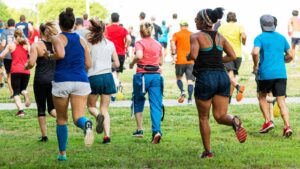So, you’ve signed up for a 10k run on a whim, and the race day is just around the corner. You’re wondering, “Can I pull this off without any training?” The answer is a resounding yes! With the right approach and a few savvy strategies, it’s possible to cross that finish line without weeks of preparation.
Tips for Running a 10k Without Training
Delving deeper into the context of a 10k run, this section dissects what it entails and the common hurdles participants often encounter.
 In layman’s terms, a 10k run signifies a race covering a distance of 10 kilometers. In miles, this equates to roughly 6.2 miles. As part of the standard international road race events, 10k runs act as a middle ground, bridging the gap between a sprint and a marathon. It’s a race that invites participants of all fitness levels, from casual joggers testing their pace, to professional athletes refining their stamina and tenacity.
In layman’s terms, a 10k run signifies a race covering a distance of 10 kilometers. In miles, this equates to roughly 6.2 miles. As part of the standard international road race events, 10k runs act as a middle ground, bridging the gap between a sprint and a marathon. It’s a race that invites participants of all fitness levels, from casual joggers testing their pace, to professional athletes refining their stamina and tenacity.
Every tips for running a 10k without training presents its own set of challenges. Foremost among them is the dichotomy between speed and distance. Unlike shorter races where speed is king, a 10k run requires a careful balance between maintaining speed and conserving energy for the entire length. The runner must strike a balance between pushing forcefully and reserving adequate stamina to avoid burnout before reaching the finish line. Another major challenge arises from varying terrains, weather conditions, and altitude—factors that can dramatically influence the difficulty of the race. These potential hurdles underline the idea that successful completion of a 10k run isn’t just about distance—it’s about strategy and resilience.
The Effect of Lack of Training on Running a 10k
There’s often a misconception that natural athleticism can replace structured training. However, athletic prowess doesn’t equate to 10k running readiness. Another fallacy is the assumption that adrenaline compensates for the lack of training. Adrenaline does boost performance temporarily, but it’s short-lived. Misunderstanding the nature of endurance, believing in “muscle memory” from past workouts, or underestimating race difficulty are other misconceptions that could pose serious issues.
 Running a 10k without training can expose individuals to a spectrum of health risks. Injuries such as pulled muscles, shin splints, and runner’s knee, could occur due to sudden extensive exercise. Cardiovascular complications might emerge due to an unexpected strain on the heart. Additionally, the risk of dehydration and heat stroke increases as novices often neglect correct hydration techniques.
Running a 10k without training can expose individuals to a spectrum of health risks. Injuries such as pulled muscles, shin splints, and runner’s knee, could occur due to sudden extensive exercise. Cardiovascular complications might emerge due to an unexpected strain on the heart. Additionally, the risk of dehydration and heat stroke increases as novices often neglect correct hydration techniques.
Lastly, physical repercussions aside, unprepared running may lead to performance anxiety, negative self-perception, and demotivation. Thus, understanding and mitigating these potential risks strengthens the importance of proper training, despite the challenge it presents to first-time or untrained runners.
The Role of Nutrition and Recovery
 The diet preceding a tips for running a 10k without training can influence performance significantly. Consuming carbohydrates, for instance, stocks up glycogen reserves in the liver and muscles. This stored glycogen plays a crucial role, serving as the body’s primary fuel during the run. It’s essential to include foods like pasta, rice, and bread in meals leading up to the race. Additionally, hydration can’t be undervalued. Runners ought to drink plenty of fluids, like water and energy drinks, to avoid dehydration, which could hamper performance. Lastly, avoid eating large meals or new foods immediately before the race to avert possible digestion issues.
The diet preceding a tips for running a 10k without training can influence performance significantly. Consuming carbohydrates, for instance, stocks up glycogen reserves in the liver and muscles. This stored glycogen plays a crucial role, serving as the body’s primary fuel during the run. It’s essential to include foods like pasta, rice, and bread in meals leading up to the race. Additionally, hydration can’t be undervalued. Runners ought to drink plenty of fluids, like water and energy drinks, to avoid dehydration, which could hamper performance. Lastly, avoid eating large meals or new foods immediately before the race to avert possible digestion issues.
Recovery after a 10k run is equally as vital as prior diet preparation. Post-race recovery involves two primary aspects: Nutrition and Rest. Both play instrumental roles. Consuming foods rich in proteins and carbohydrates revamps glycogen stores and aids muscle tissue repair. Here, foods like eggs, chicken, quinoa, or fruits come into play. Furthermore, fluid intake helps replace lost electrolytes and prevent dehydration post-run.
Nutrition and Recovery
While it’s not the ideal scenario, running tips for running a 10k without training can be feasible with the right mindset, strategies, and resilience. It’s key to understand the challenges and risks involved, including potential health issues. Nutrition and recovery play crucial roles in this endeavor. A pre-race diet rich in carbohydrates and proper hydration can fuel the body for the demanding race.

